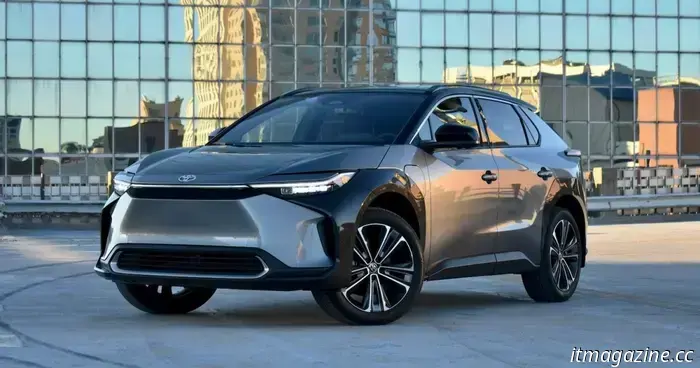
Toyota changes direction: 15 new electric vehicles and one million cars by 2027.
Stephen Edelstein / Digital Trends
After years of carefully navigating the electric vehicle (EV) market, Toyota is now significantly increasing its commitment to fully electric vehicles. The Japanese automaker, which has traditionally focused on hybrids, plans to create approximately 15 fully electric models by 2027, expanding from the five it currently offers. These new models will include vehicles from both the Toyota and Lexus brands, with production expected to hit 1 million units per year by that timeframe, according to a report from Nikkei.
This strategy represents a major change for Toyota, which has so far adopted a cautious stance toward electric cars. The company sold only 140,000 EVs worldwide in 2024, accounting for less than 2% of its overall global sales. Nevertheless, Toyota aims to establish a much larger footprint in the EV market, targeting around 35% of its global production to be electric by the decade's end.
The Nikkei report indicates that the company intends to broaden its production footprint beyond Japan and China, expanding into the U.S., Thailand, and Argentina. This move would help mitigate the effects of President Donald Trump’s 25% tariffs on all vehicle imports and also cut down delivery times. Additionally, Toyota is investing in a battery plant in North Carolina.
Currently, Toyota has only two fully electric models available in the U.S. market: the bZ4X and the Lexus RZ. The automaker is anticipated to launch additional models such as the bZ5X and a possible electric variant of the popular Tacoma pickup truck.
In a separate announcement, Toyota, Honda, and South Korea’s Hyundai stated on April 4 that they would not increase prices for at least the coming months following the implementation of U.S. tariffs. A different Nikkei report mentioned that Toyota’s North American division has informed its suppliers that it will cover the additional costs of parts imported from Mexico and Canada. An extra 25% tariff on automotive parts imported to the U.S. is set to take effect on May 3.
Nick Godt has reported on global business news across three continents for more than 25 years.
Cadillac’s entry-level Optiq electric SUV represents a successful downsizing effort. Electric vehicles are not only beneficial for the environment and offer greater technological potential, but they also disrupt traditional practices in the auto industry. Badge-engineered luxury cars are a necessary, though tedious, aspect of any automaker’s financial strategy. The possible profits from sharing platforms and powertrains between luxury and mainstream brands would be enticing. However, concealed common elements must be disguised, which the gasoline Cadillac XT6 fails to do effectively, while the all-electric Cadillac Lyriq succeeds in achieving this.
The new Renault 5 Turbo 3E, boasting 540bhp, is just the first in a line of exciting retro releases from the French manufacturer. While this "hyper-hatch" is a limited production model, Renault's head of design, Lauren van den Acker, indicated that there is "a window of opportunity" for additional retro revivals like this one.
Google is rolling out Android Auto 14.0 to the public. Although this update does not introduce any new features, it points to a significant change on the horizon. As reported by 9to5Google, the update suggests that Gemini is set to take over from Google Assistant in Android Auto. Behind the scenes, image assets for Gemini and Gemini Live are also being prepared.





Other articles
 Samsung has reduced the price of its 49-inch OLED G9 gaming monitor by $700.
The 49-inch Samsung Odyssey OLED G9 gaming monitor has a standard price of $1,800, but it is currently available for purchase from Samsung for $1,100.
Samsung has reduced the price of its 49-inch OLED G9 gaming monitor by $700.
The 49-inch Samsung Odyssey OLED G9 gaming monitor has a standard price of $1,800, but it is currently available for purchase from Samsung for $1,100.
 This modular Pebble and Apple Watch contender has just exceeded its funding objectives.
Both the and are facing stiff competition as a new modular brand, UNA, is generating substantial support and enthusiasm. The UNA Watch is developed by a Scottish firm aiming to provide users with modular control over smartwatch upgrades and repairs. This comes as many smartwatch companies are pushing for subscriptions and shutting down their […]
This modular Pebble and Apple Watch contender has just exceeded its funding objectives.
Both the and are facing stiff competition as a new modular brand, UNA, is generating substantial support and enthusiasm. The UNA Watch is developed by a Scottish firm aiming to provide users with modular control over smartwatch upgrades and repairs. This comes as many smartwatch companies are pushing for subscriptions and shutting down their […]
 Audio-Technica honors Record Store Day by releasing a gold edition of its top-selling turntable.
In celebration of Record Store Day 2025 this weekend, Audio-Technica has released an exclusive gold edition of its popular AT-LP60XBT turntable.
Audio-Technica honors Record Store Day by releasing a gold edition of its top-selling turntable.
In celebration of Record Store Day 2025 this weekend, Audio-Technica has released an exclusive gold edition of its popular AT-LP60XBT turntable.
 Google has recently introduced vision capabilities to its AI, but it is still not accessible to everyone.
Google has officially announced the launch of a robust Gemini AI feature that allows the intelligence to have visual capabilities. This initiative began in March when Google started to showcase it, and it is now more broadly accessible. However, before you get too enthusiastic, it's important to note that, for now, it is only available on the [...] and [...] devices.
Google has recently introduced vision capabilities to its AI, but it is still not accessible to everyone.
Google has officially announced the launch of a robust Gemini AI feature that allows the intelligence to have visual capabilities. This initiative began in March when Google started to showcase it, and it is now more broadly accessible. However, before you get too enthusiastic, it's important to note that, for now, it is only available on the [...] and [...] devices.
 Hurry! Get a Samsung 55-inch QLED for less than $500 while you can.
The Samsung 55-inch Q60D 4K QLED is available today for just $500. Snag this vibrant and brilliant television before it goes back to its regular price!
Hurry! Get a Samsung 55-inch QLED for less than $500 while you can.
The Samsung 55-inch Q60D 4K QLED is available today for just $500. Snag this vibrant and brilliant television before it goes back to its regular price!
 The creator of The White Lotus, Mike White, suggests where season 4 may take place.
Following the surprising conclusion of season 3, The White Lotus creator Mike White discussed possible locations for season 4.
The creator of The White Lotus, Mike White, suggests where season 4 may take place.
Following the surprising conclusion of season 3, The White Lotus creator Mike White discussed possible locations for season 4.
Toyota changes direction: 15 new electric vehicles and one million cars by 2027.
Toyota intends to create around 15 fully electric models by 2027, increasing from the current five. These models will encompass vehicles from both the Toyota and Lexus brands, with an anticipated production of 1 million units each year by that time.
